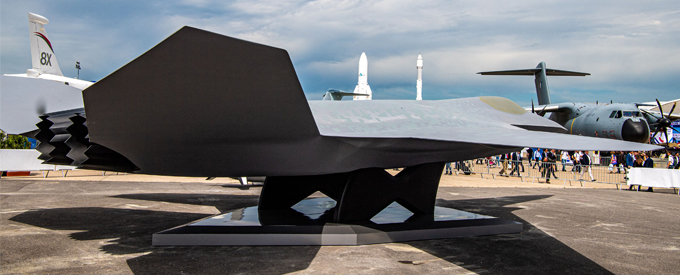2020-03-01
Next Steps for Europe’s Future Combat Air System
France and Germany have tied up to develop the Future Combat Air System (FCAS), which is set to bring about an all-new generation of combat platform for Europe. The governments of France and Germany have awarded Dassault Aviation, Airbus, together with their partners Safran, MTU Aero Engines, MBDA and Thales, the initial framework contract (Phase 1A), which launches the demonstrator phase for FCAS.
This framework contract covers a first period of 18 months and initiates work on developing the demonstrators and maturing cutting-edge technologies, with the ambition to begin flight tests as soon as 2026.
Since early 2019, the industrial partners have been working on the future architecture as part of the programme’s so-called Joint Concept Study. Now, the FCAS programme enters into another decisive phase with the launch of the demonstrator phase.
This phase will, in a first step, focus on technological challenges such as:
- Next Generation Fighter (NGF), with Dassault Aviation as prime contractor and Airbus as main partner, to be the core element of Future Combat Air System.
- Unmanned systems Remote Carrier (RC) with Airbus as prime contractor and MBDA as main partner.
- Combat Cloud (CC) with Airbus as prime contractor and Thales as main partner.
- Engine with Safran as prime contractor and MTU as main partner.
A Simulation Environment will be jointly developed between the involved companies to ensure the consistency between demonstrators.
Increased Momentum
The launch of the Demonstrator Phase underlines the determination of the FCAS partner nations and the associated industry to move forward and cooperate in a fair and balanced manner. The increased momentum enables industry to deploy the necessary resources and best capabilities to develop this decisive European defence project. FCAS will be the cornerstone project guaranteeing Europe’s future operational, industrial and technological sovereignty.
The next important step in the FCAS programme will be the onboarding of Spain and the involvement of additional suppliers from Phase 1B onwards, which will succeed Phase 1A after its successful conclusion.
Demonstrators for Remote Carriers
As part of the Phase 1A Demonstrators contract for the FCAS, Airbus and MBDA decided to join forces to develop demonstrators for Remote Carriers.
The teaming involves MBDA focusing on the development of small and medium class platforms together and under the lead of Airbus. On its part, Airbus will address the whole Remote Carrier scope and in particular teaming intelligence, whilst focusing on medium to large platforms.
MBDA’s portfolio of capabilities brings complementary expertise into the Airbus led Remote Carrier domain and is expected to contribute significantly to the future capabilities of Air Power. The company has unique expertise in launching, flying and autonomy of small and large missiles.
Airbus, as a major European player in UAS, is building on its full-scale expertise in small to large systems and in Man-Unmanned Teaming.
Force Multipliers
Designed to act as force multipliers, the Remote Carriers, are unmanned aerial vehicles (UAV), which aim at reducing the risks for manned aircraft by taking over specific air operations’ roles within high risk environments, providing new air warfare capabilities and teaming in combination with and coordinated by other manned air assets.
Capable of “Cross Platform Mission Management”, the Remote Carriers will complement and augment manned fighter aircraft capabilities performing in close cooperation yet with a high degree of automation to improve the mission performance in high intensity conflicts, and increase the combat mass to better compensate limited numbers of sophisticated manned fighter aircraft.
Allowing more agile and faster adaptation and development of technologies, the Remote Carriers will increase operational capabilities at a very fast pace.
Air Combat Cloud
Furthermore, Airbus and Thales have signed an agreement for the development of the Air Combat Cloud, which will enable the FCAS system.
Under this agreement, Airbus and Thales will work jointly on the structural design of the Air Combat Cloud to support collaborative air operations at national and multinational levels and will perform a first phase of technology demonstrations of air combat cloud capabilities.
FCAS will deliver increasing operational effects by leveraging the collaborative capabilities of connected manned and unmanned platforms, bringing the next level of Air Power to denied environments. Within FCAS, the Air Combat Cloud will connect and synchronise all the platforms in real time.
Airbus will bring the strength of its wide range of expertise in combat and mission aircraft, space systems and collaborative C5ISR (digitalised command and control, communication, cybersecurity, intelligence, surveillance, reconnaissance). While Thales will bring its expertise in Defence Equipment and Solutions, in space and aerospace systems, driven by its global leadership in digital security.


No Comments